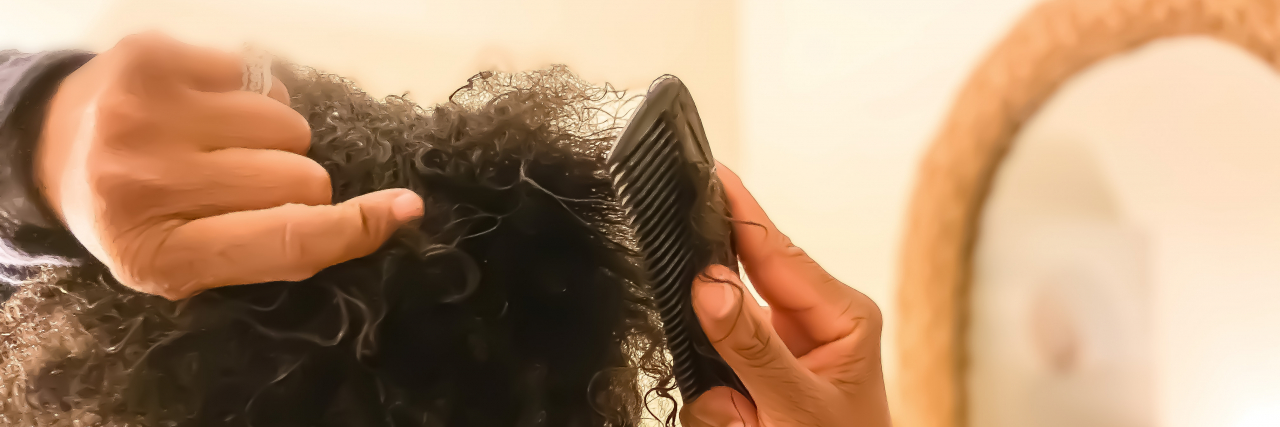Doing my hair and getting my hair done has always been a struggle.
Back in the days of creamy crack relaxers, head hanging over the kitchen sink, eyes closed tight to keep the shampoo out, and hours of sitting on the floor, squirming and readjusting while my cousin, auntie, the neighbor two houses down, or my mom’s coworker braided or sewed weave through my hair, it’s been a pain. My hair has had its different eras as my lifestyle has changed over the years, but nothing really prepared me for how difficult hair maintenance would be when I became disabled.
As a Black non-binary woman, having good hair presentation has been instilled in me since I was a baby. With my 4C hair, I was always subjected to ridicule if my hair wasn’t done up, even if it was in its natural afro state. “When will you do something with your hair?” The expectation was that something was always done to it or else it was a mess. Texturism is a huge issue here and though I’ve fallen in love with my kinks and naps, the effects still linger.
And this is where being disabled makes this even harder.
Wash day is a once-a-week ordeal and I dedicate an entire day to the process.
Wash. Detangle. Wash. Condition. Detangle. Style. Dry. A process that, on paper, seems like it would be easy actually takes hours and so many spoons. Before my joint pain, fatigue, and brain fog, I’d stand in the shower for nearly an hour washing, conditioning, and detangling trying to shower in-between steps, just to get out the shower and stand in front of the bathroom sink, littered with hair products and tools as I parted my hair, applied product and proceeded to style my hair. Whether it’s a twist out, wash n’ go, Bantu knots, braids, etc., the process was long and arduous.
When I became disabled, my natural hair came down to the middle of my back when stretched and I’d been growing it out for almost five years. The wash day process was hitting my body hard. I was unable to stand for that long, holding my arms up to wash, detangle and style was exhausting, feeling like I had weights hanging from my forearms. I frequently had days where I could barely use my hands without agonizing pain.
I couldn’t afford to go to a hair salon or stylist multiple times a month, nor could my body (or my autism) handle hours of someone in my hair just to have it done for a few weeks. I’d keep pushing the wash day off week after week. My hair was breaking off at the ends, shedding, and my scalp health and condition declined. My hair tangles so easily and going without detangling it made detangling later on more painful (both on my scalp and my hands) and left more and more hair in the brush. I’d start to style my hair only to put off finishing it for days due to fatigue and flare-ups. My confidence in myself would fall flat. I already felt sick but now my appearance definitely reflected it and, “when you doing something with your hair?” played over and over again in my head.
A year to two years in, I decided to bite the bullet and loc my hair up to make things easier on myself. For a little while, it seemed like things were working. My wash days were shorter and I was saving myself energy weekly. I soon came to learn that the trade-off to weekly washing and styling my hair led to harder work to retwist my locs. That too fell by the wayside the sicker I got, and in February of 2021, I had to cut my locs off and my hair down to less than an inch of hair because having hair was completely unmanageable.
My hair was and still is my pride and joy. Starting from little to no hair helped me repair my relationship with it, learning to give myself more grace when I wasn’t able to stick to the routine my hair needed. Spending more time learning what my hair now needed made wash days easier. Wash day is still long and exhausting, but now I do my routine while sitting in my shower chair in my shower with my handheld showerhead. I have better tools to help detangle and wash my hair that lessen the work on my hands. I take frequent breaks, even if it means wash day takes the entirety of my day, because taking my time to rest my body instead of trying to rush through the process always leads to the juiciest twist-outs.
Getty image by Catherine McQueen.

